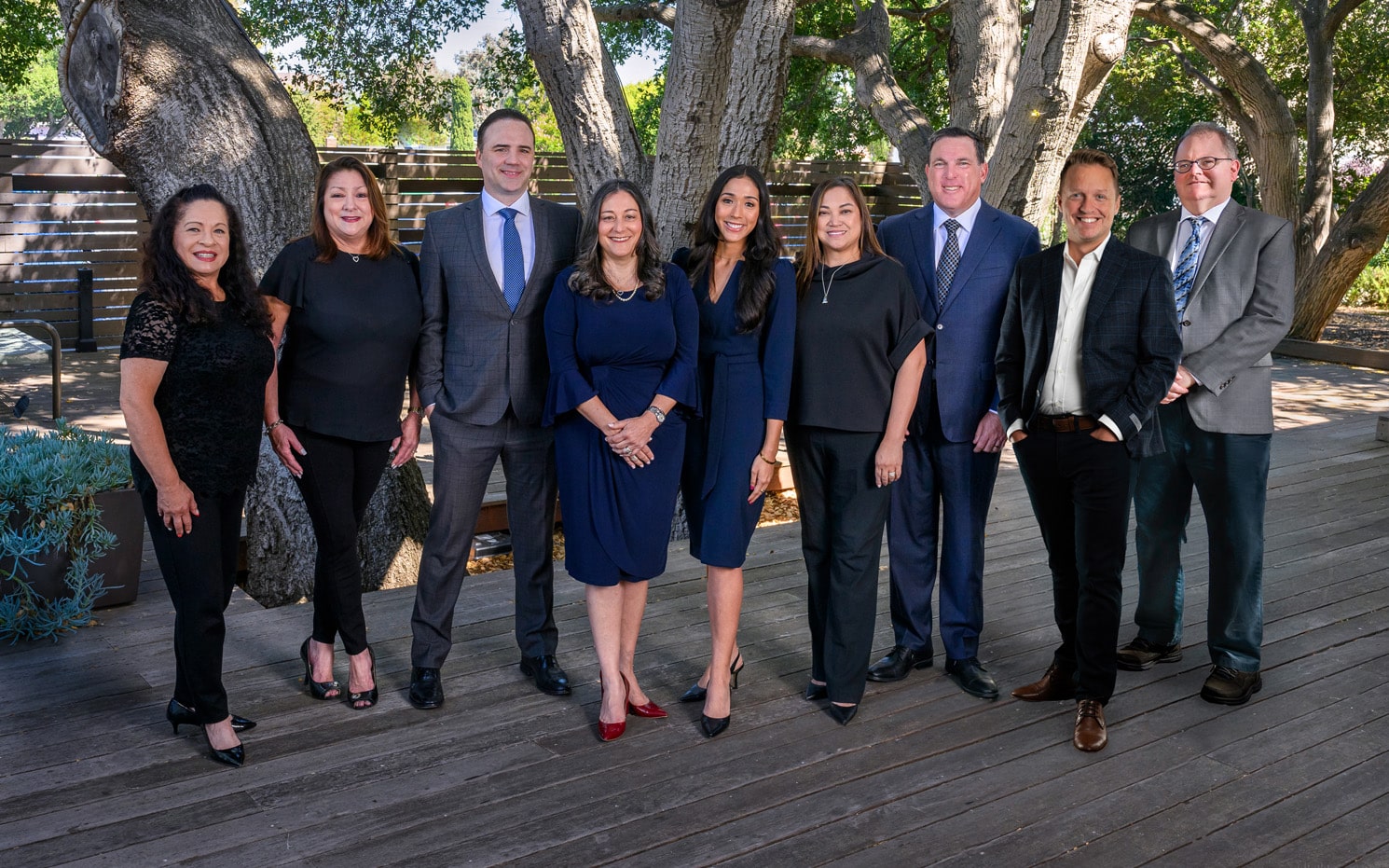
Welcome to the Law Offices of Chauvel & Glatt, LLP!
We are based in San Mateo, California, and serve the Peninsula and surrounding communities, as well as clients throughout Los Angeles, San Diego and San Bernardino Counties and the State of California. We’ve been providing legal services for more than 3 decades and specialize in the fields of Business Law, Real Estate Law, Employment Law, Estate Planning/Probate, Transportation Law, and Intellectual Property Law. We bring a wide range of knowledge and experience, with members of our team speaking English and Spanish.
Our attorneys enjoy working collaboratively and strive to keep matters as simple as possible. We share a desire to give you unparalleled customer service by being proactive and responsive to all your needs.

Chauvel & Glatt Staff
Linda Taylor, Office Manager & Senior Legal Assistant, [email protected]
Mellina Calilung, Account Manager, [email protected]
Amelia Valencia, Receptionist, [email protected]



Firm News
- Employment Law
Posted in: News
California Minimum Wage Increases on July 1: What Employers Need to Know Now
If your business employs hourly workers in California, mark July 1, 2025, on your calendar. That’s when several cities and counties across the state will raise their local minimum wages—again.
These changes are especially important for employers of lower-wage, hourly workers in sectors like retail, hospitality, food service, janitorial services, security, logistics, and manufacturing. A failure to comply with the new wage rates—even by mistake—can expose your company to lawsuits, penalties, or audits.
Here’s what you need to know to stay compliant, control costs, and keep your business protected.
The Basics: California Has Multiple Minimum Wages
While California’s statewide minimum wage is currently $16.50 per hour for all employers, that’s not the full picture. Many cities and counties have adopted their own, higher local minimum wage ordinances. These local laws often adjust their wage rates every July 1 based on inflation or policy goals.
This means if you operate in multiple locations—or if your employees move between cities—your payroll team needs to apply the highest applicable wage for each worker.
Who’s Raising Wages on July 1?
Here are just a few of the jurisdictions increasing their minimum wages on July 1, 2025:
- San Francisco: $19.18/hour
- Emeryville: $19.90/hour
- Berkeley: $19.18/hour
- City of Los Angeles: $17.87/hour
- Pasadena: $18.04/hour
- Santa Monica: $17.81/hour
- Fremont: $17.75/hour
- Alameda: $17.46/hour
- Milpitas: $18.20/hour
- Unincorporated LA County: $17.81/hour
Special industry rates also apply in some cities. For example:
- West Hollywood: $20.22/hour for hotel workers
- Long Beach: $25/hour for hotel workers
- Los Angeles (Hospitality Ordinance): Up to $30.15/hour for some hotel and airport workers
Why These Changes Matter to Employers of Low-Wage Workers
For employers with large workforces of lower-wage, hourly employees, even a small wage increase can significantly impact labor costs. Here’s why these local increases matter:
- Cost Pressures: A 50-cent or $1 per hour increase across hundreds of employees adds up fast.
- Wage Compression: As minimum wages rise, other wages may need to follow to maintain pay differentials.
- Compliance Risk: If you miss a change—even for just a few workers—you’re open to lawsuits, wage claims, and fines.
- Payroll Complexity: Running payroll for multiple locations now requires local wage tracking.
What Happens If You Don’t Comply?
Under California law, paying less than the required minimum wage can trigger:
- Backpay, plus interest
- Liquidated damages (essentially doubling the amount owed)
- Waiting time penalties (up to 30 days of wages)
- Class actions or Private Attorneys General Act (PAGA) claims
- Investigations by the Labor Commissioner
In short: getting this wrong can be expensive—even if it was unintentional.
Your July 1 Compliance Checklist
Here are 7 action items every employer should consider right now:
1. Check the Minimum Wage in Each Location
Don’t assume the state rate applies. Review where your employees physically perform work and check that city or county’s current minimum wage.
2. Update Payroll Rates Before the First July Pay Period
Make sure any payroll changes are entered into and processed before the first pay period that includes July 1, 2025.
3. Revise Wage Notices
Under Labor Code section 2810.5, California requires employers to give written notice to each employee of their pay rate. You’ll need to update and redistribute this if the employee’s wage is changing.
4. Post the New Wage Rates
Many local ordinances require you to post updated wage information where employees can see it (e.g., breakrooms, time clocks). Some cities offer posters on their websites.
5. Review of Remote and Mobile Work Locations
If employees work remotely or across city lines (e.g., delivery drivers, in-home caregivers), determine which jurisdiction’s wage applies and ensure compliance with the highest rate.
6. Account for Special Industry Wages
If you operate a hotel, airport-related business, restaurant, or healthcare facility, double-check whether local ordinances impose higher or sector-specific minimums.
7. Plan for Wage Compression
Supervisors or experienced staff may expect raises when entry-level pay increases. Evaluate whether compression is creating morale or retention problems.
A Note on Exempt Employees
Remember: these minimum wage increases only apply to non-exempt, hourly employees.
However, there’s an indirect effect on exempt employees too. In California, the minimum salary for most exempt employees must be at least 2x the state minimum wage—currently $66,000/year. If the state minimum increases again in 2026 (as expected), this number will likely rise again in January.
Tips for Multi-Location Employers
Employers with multiple locations often struggle to keep up with the patchwork of city and county rules. Here’s how to get ahead of it:
- Build a wage map of all jurisdictions where you operate
- Use payroll software or legal alerts to flag rate changes
- Assign HR or legal staff to monitor local ordinances
- Audit pay practices each June and December, ahead of major change dates
Looking Ahead
Many of these local ordinances are tied to inflation and adjust annually on July 1. Others adjust on January 1, alongside state changes. In 2026, we can expect another round of increases—possibly higher if inflation continues.
There are also ballot measures and legislation that may raise sector-specific wages (particularly in healthcare and hospitality), so keep an eye on local politics.
Final Thoughts: Don’t Wait
If you’re an employer of hourly workers in California, July 1 is not just a date—it’s a legal and operational deadline.
Get ahead of wage increases now by confirming locations, adjusting pay systems, and training managers. A few hours of preparation now can save tens of thousands of dollars—and protect your business from unnecessary risk.
If you need help reviewing your wage compliance, revising employee notices, or understanding local ordinances, now is the time to speak our team of employment lawyers.
- Uncategorized
Posted in: News
FOR IMMEDIATE RELEASE
April Glatt Honored as a 2025 Silicon Valley Woman of Influence
June 27, 2025, in San José, CA – The Silicon Valley Business Journal named April S. Glatt, Managing Partner and Co-Founder of Chauvel & Glatt LLP, as one of its 2025 Women of Influence. This award recognizes her as a leader in the legal and business communities across the Bay Area.
About April Glatt
April Glatt is an exceptional lawyer with almost 30 years of experience. She is known for her practical approach and deep knowledge in areas like employment law, business counseling, and real estate transactions. April is the Managing Partner of the San Mateo-based law firm Chauvel & Glatt LLP. She leads a team that provides businesses across California with a high level of care and legal accuracy.
April worked as a prosecutor and held a number of public sector jobs before starting her own business, including being an Assistant State’s Attorney in Illinois & San Diego District Attorney’s Office. She is licensed in California, Illinois, and a number of federal courts. April is an active member of her professional community. She is the head of the Labor and Employment section of the San Mateo County Bar Association, teaches continuing legal education classes, and leads programming on updates to employment law for other lawyers. Outside of court, she is known for her volunteer work and for mentoring other women professionals and law students through business networking groups.
Honoring Women Who Lead
The Silicon Valley Business Journal’s Women of Influence awards honor women from all over the region whose work makes a big difference in the business, civic, and nonprofit communities. People who are honored are chosen because of their leadership, career success, and service to others. April was chosen because she is an excellent lawyer and has made a big difference as a mentor and advocate for business owners and professionals in the area.
On June 26, 2025, at the Santa Clara Marriott, there was a party to honor this year’s winners. The evening included a reception, dinner, and awards ceremony honoring great women who are helping to shape the future of Silicon Valley. Colleagues, community leaders, and supporters all came together for the event.
The Award Program
Every year, the Silicon Valley Business Journal makes a list of women who are making a name for themselves in technology, law, healthcare, finance, and other fields. 74 women were selected to the 2025 class who are the best in their fields when it comes to innovation, dedication, and leadership. A group of judges looks over the nominations and chose the winners based on their merit and how much they have done for the community. There were also speeches from business and civic leaders, music, and chances for the best professionals in the area to meet each other.
April being named a Woman of Influence shows how dedicated she is to her clients, her profession, and the community where she lives. Her leadership goes well beyond the courtroom. She helps clients deal with complicated legal issues, trains other lawyers, and fights for fair workplace practices. April said in response to the honor, “I’m honored to be among such an inspiring group of women. My whole team and the clients who trust us every day deserve this award.”
Visit www.chauvellaw.com to find out more about Chauvel & Glatt LLP or to set up a meeting. Please email [email protected] for press inquiries.
April Glatt, congratulations on this well-deserved award. Her commitment to the law and her strong support for businesses are continually important in shaping the future of Silicon Valley.
- Discrimination, Employment Law
Posted in: News
Discrimination complaints can pose serious legal and reputational risks to employers—especially in California, where employee protections are among the most robust in the country. Even a single unresolved or mishandled complaint can trigger litigation, regulatory scrutiny, or widespread internal disruption. However, when addressed properly, these complaints can be an opportunity to correct internal issues, strengthen workplace culture, and demonstrate a commitment to compliance and fairness.
Understanding Workplace Discrimination Under California Law
California’s Fair Employment and Housing Act (FEHA) offers broad protections for employees, extending well beyond federal law. Discrimination under FEHA occurs when an employer takes adverse action against an employee or applicant based on a protected characteristic. These include race, color, national origin, ancestry, sex, gender identity, sexual orientation, age (40 and over), religion, disability, medical condition, genetic information, marital status, and military or veteran status.
It’s critical to understand that discrimination can be overt or subtle. It may involve a direct refusal to hire someone based on race or a pattern of excluding older employees from promotions. California law also recognizes disparate impact claims, which involve facially neutral policies that disproportionately affect a protected group.
Unlike harassment, which typically involves inappropriate behavior that creates a hostile work environment, discrimination focuses on unequal treatment in employment decisions. However, both are often intertwined, and both require prompt action by the employer.
The Employer’s Legal Duty Upon Receiving a Complaint
Employers in California are legally obligated to respond to any discrimination complaint—whether formal or informal, verbal or written. FEHA mandates that employers take all reasonable steps to prevent and correct discriminatory conduct. This includes initiating a prompt, thorough, and impartial investigation of every complaint.
Even if the complaint seems minor or baseless, failing to investigate can expose the company to liability. Employers must also protect complainants and witnesses from retaliation, which itself is a separate violation under FEHA. The law does not require that discrimination be proven for protections to apply—only that the employee had a good-faith belief that discrimination occurred.
Ignorance of a complaint or lack of intent is not a defense. Once an employer knows or should know about potential discrimination, the duty to act is triggered.
Creating a Strong Anti-Discrimination Policy
A clearly written, legally compliant anti-discrimination policy is the first line of defense against liability. California law requires employers with five or more employees to have a written policy that prohibits discrimination, harassment, and retaliation. This policy must include:
- A list of all protected characteristics under FEHA
- A clear complaint process with multiple avenues for reporting
- A prohibition against retaliation
- A statement that complaints will be investigated promptly and thoroughly
- An assurance of confidentiality to the extent possible
- A commitment to take corrective action if misconduct is found
Employers should distribute this policy in writing, include it in employee handbooks, and discuss it during onboarding and periodic training. Policies that sit on a shelf or exist only in theory offer little legal protection. They must be embedded into workplace culture and actively enforced.
Responding Immediately to a Discrimination Complaint
The first moments after receiving a discrimination complaint are critical. A timely, professional response not only ensures compliance but also helps reassure the complainant that their concerns are being taken seriously.
Start by acknowledging receipt of the complaint without drawing conclusions. Refrain from expressing judgment, taking sides, or making promises. Depending on the type of discrimination complaint, an employer may need to hire an internal or external investigator to conduct a workplace investigation.
Depending on the nature of the complaint, employers may consider implementing temporary workplace adjustments to separate the parties or minimize further harm. These might include schedule changes or supervisory shifts. All actions should be documented, including the initial complaint, response, and rationale for any interim measures.
Conducting a Legally Sound Internal Investigation
A quality investigation is the backbone of a solid employer defense. While California law does not prescribe a specific format, courts expect employers to follow a standard of reasonableness. Depending on the discrimination complaint, an employer may need an internal or external investigator to undergo a workplace investigation. This determination should be made with the advice and counsel of an experienced employment attorney.
Begin by developing an investigation plan. Identify key witnesses, relevant documents, and the central questions that need answering. The investigator should maintain neutrality, avoid conflicts of interest, and keep information confidential to the extent practical.
Interviews should be conducted privately, using open-ended, non-leading questions. Start with the complainant, then interview witnesses, and finally, the accused. Take detailed notes or, with consent, record conversations. Review emails, time records, personnel files, and other documents to corroborate statements.
Throughout the process, avoid common missteps, such as ignoring subtle forms of bias, dismissing complaints as personality conflicts, or delaying interviews.
Reaching Findings and Taking Appropriate Action
After gathering all relevant facts, the investigator must determine whether the complaint is substantiated. This is typically based on a preponderance of evidence—whether it’s more likely than not that discrimination occurred. Again, it is recommended that you consult with an experienced employment attorney to discuss this determination.
If the findings support the complaint, the employer must take appropriate remedial action. This could range from counseling or training to demotion or termination, depending on the severity. The goal is not only to correct the behavior but to prevent it from recurring.
Even when a complaint is unsubstantiated, follow-up is essential. Notify both parties of the outcome in general terms, reiterate your anti-retaliation policy, and document the closure. Avoid sharing details that could violate confidentiality or spark further conflict.
Post-Investigation Best Practices
Once the investigation concludes, don’t treat the matter as closed. Follow up with the complainant to ensure no retaliation has occurred. Evaluate whether broader issues were uncovered—such as inadequate training or flawed supervisory practices—and take corrective action.
Review your policies and consider additional training if necessary. Maintain all documentation related to the investigation, including notes, emails, and summaries. These records can be vital if a lawsuit or government inquiry follows.
How to Minimize Legal Liability
Proactive efforts significantly reduce the risk of liability. A timely and well-documented investigation often serves as a strong defense in administrative or court proceedings. FEHA recognizes the value of employer efforts to prevent and address discrimination and may reduce damages when an employer acts reasonably and in good faith.
Employers should consider employment practices liability insurance (EPLI), which can help cover the costs of legal defense and settlements. Work closely with legal counsel when a complaint involves high-ranking employees, sensitive or multiple allegations, or potential class-wide issues. Early legal guidance can help avoid procedural errors that could weaken your defense later.
Special Considerations for Small Businesses in California
Small businesses often face unique challenges in handling discrimination complaints, including limited HR resources and closer personal relationships among employees. Nonetheless, the legal standards under FEHA apply to any employer with five or more employees.
Small employers should ensure they have at least one trained manager or designated HR contact to receive and investigate complaints. Where internal resources are limited, consider hiring an outside investigator or consulting employment counsel. A well-handled complaint, even in a small organization, signals professionalism and reduces risk.
The Role of Ongoing Training and Prevention
One of the most effective ways to reduce the frequency and severity of workplace discrimination claims is through consistent, legally compliant training. While responding properly to complaints is essential, proactive education and culture-building are what help prevent issues from arising in the first place.
Annual Sexual Harassment and Anti-Discrimination Training Requirements
Under California law, employers with five or more employees must provide sexual harassment prevention training to all workers. Supervisors must receive two hours of training every two years, while nonsupervisory employees must receive at least one hour. This training must cover not only harassment but also discrimination, retaliation, and reporting procedures. It must be interactive, accessible, and reflect California-specific legal standards.
Employers must also train new hires and newly promoted supervisors within six months of their start date. These requirements apply to both full-time and temporary employees and must be repeated at least every two years. Failing to comply can expose the business to penalties and weaken the employer’s legal position in the event of a complaint.
Manager-Specific Responsibilities and Risks
Supervisors and managers are often the first to observe or receive complaints in the workplace, making them a critical line of defense. California law holds employers vicariously liable for harassment or discrimination by supervisors, even if upper management is unaware of the conduct.
This makes targeted managerial training essential. Supervisors should know how to recognize subtle signs of discrimination, respond appropriately to informal concerns, and follow reporting protocols to escalate complaints without delay. They should also be trained on how to avoid retaliation, including seemingly minor actions—such as schedule changes or altered duties—that could be interpreted as punitive.
When supervisors fail to act or mishandle concerns, they not only expose the business to legal risk but can also be held personally liable under certain circumstances.
Preventing Issues Through Workplace Culture
Training is most effective when paired with a strong organizational culture that values respect, inclusion, and accountability. Employers should go beyond minimum legal requirements and foster open communication, transparency, and trust throughout the organization.
This includes addressing unconscious bias, celebrating diversity, and promoting equitable advancement opportunities. It also means empowering employees to speak up without fear of retaliation and ensuring leadership models the values reflected in your anti-discrimination policies.
Preventive measures won’t eliminate every complaint, but they significantly reduce the likelihood of legal claims by building a workplace environment where employees feel safe, valued, and heard.
When to Call Legal Counsel
Even employers with robust policies and good intentions can find themselves facing high-stakes legal consequences when allegations of discrimination arise. Knowing when to bring in legal counsel is crucial for minimizing liability and navigating complex situations effectively.
Some complaints raise clear red flags that litigation could follow. These include:
- Allegations involving high-level executives or long-standing patterns of behavior
- Complaints that include evidence of retaliation or termination shortly after reporting
- Involvement of protected categories with recent legal developments (e.g., gender identity, disability)
- Anonymous complaints hinting at widespread cultural or systemic issues
- Employees represented by attorneys or who request an accommodation under FEHA or ADA
- Multiple complaints from the same department or about the same individual
In these cases, failing to involve counsel early could lead to missteps in the investigation, inadequate documentation, or ill-considered disciplinary decisions—all of which can be used against the employer in court or during agency review.
How Early Legal Involvement Can Reduce Liability
Involving an employment attorney early in the process allows the business to respond strategically rather than reactively. Counsel can help frame the scope of the investigation, assess potential exposure, and ensure the employer complies with all relevant obligations under California law.
Legal involvement is especially helpful when assessing whether interim measures—such as suspending the accused employee or offering paid leave—are necessary and defensible. Attorneys can also ensure documentation is handled properly, which is often pivotal in defending against claims.
Additionally, communications with outside counsel are privileged, providing an extra layer of protection when discussing sensitive issues.
What to Expect From a Discrimination Defense Strategy
If a complaint escalates to a claim with the California Civil Rights Department (CRD), the EEOC, or a civil lawsuit, legal counsel will guide the employer through each stage of the defense. This includes:
- Responding to agency charges and subpoenas
- Gathering and preserving evidence, including emails, performance records, and investigation reports
- Preparing for mediation, settlement discussions, or litigation
- Evaluating potential defenses, such as legitimate business reasons for employment actions or the employer’s good-faith efforts to prevent discrimination
- Advising on public relations or internal communications as needed
Experienced legal counsel will aim to resolve disputes efficiently while protecting the employer’s interests. In many cases, early intervention by a knowledgeable attorney helps avoid litigation altogether or leads to faster, lower-cost resolutions.
Be Proactive About Discrimination Complaints
Workplace discrimination complaints are a serious matter that demand immediate, thoughtful, and legally sound responses. California law places a heavy burden on employers to investigate and resolve claims, even when the facts seem unclear or contested.
By creating a strong anti-discrimination policy, responding quickly to complaints, conducting impartial investigations, and taking appropriate corrective action, employers can meet their obligations under FEHA while building a respectful and compliant workplace.At Chauvel & Glatt, LLP, we help California employers protect their businesses and their employees through strategic legal counsel, policy development, and assistance with workplace investigations. If you need guidance on handling discrimination complaints or strengthening your compliance program, we encourage you to schedule a consultation with our team of attorneys.





